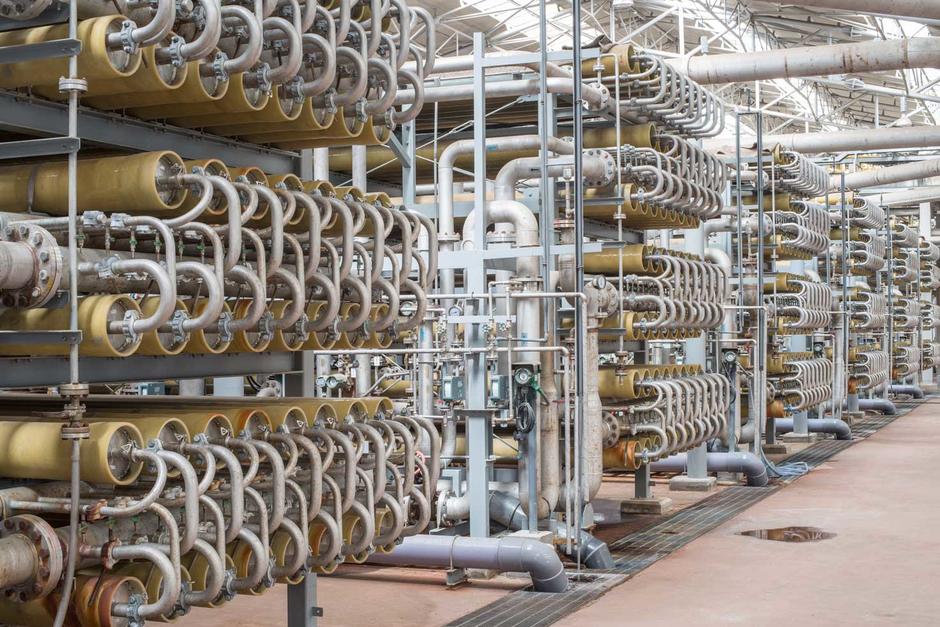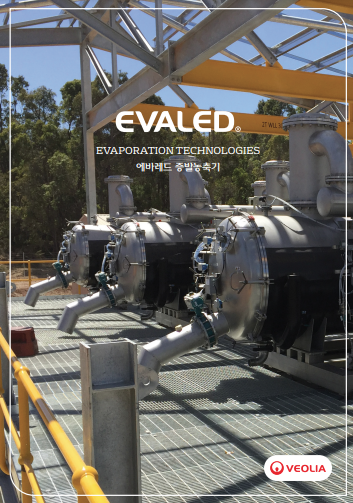Understanding the Link Between Water Consumption and Carbon Emissions
Why does water usage impact carbon emissions?
- Energy-intensive water processes: Treating and distributing water require significant energy, primarily sourced from fossil fuels. In South Korea, industries like desalination, wastewater treatment, and industrial cooling depend heavily on energy-intensive water systems, contributing to greenhouse gas emissions.
Wastewater treatment facilities, for example, use aeration systems that consume large amounts of electricity and emit greenhouse gases such as methane (CH₄) and nitrous oxide (N₂O). Similarly, semiconductor and petrochemical industries rely on reverse osmosis and filtration, which further increase energy demand.
To mitigate this, AI-driven water management platforms are optimizing energy use by predicting demand, adjusting treatment processes in real-time, and incorporating renewable energy. These solutions help industries reduce both their water and carbon footprints while enhancing operational efficiency. - High-water-consuming industries in South Korea: Semiconductors, petrochemicals, and steel industries require extensive water use.
The impact of water use in energy production
- Coal-fired power plants require large amounts of water for cooling and steam generation, contributing to high carbon emissions.
Hydrogen production from wastewater: South Korea is developing bioelectrochemical cells to produce green hydrogen while reducing industrial wastewater. - Waste Heat Recovery from Industrial Water Systems: The market for waste heat recovery systems in South Korea was valued at $1.9 million in 2022 and is projected to reach $4.3 million by 2032, growing at a CAGR of 8.5%. This growth highlights a shift toward energy-efficient practices in industrial water management. Companies are increasingly investing in technologies that capture and reuse heat from industrial wastewater, thereby reducing both energy consumption and carbon emissions.
- Example: Some petrochemical plants in Ulsan have integrated waste heat recovery systems, leading to a 15-20% reduction in energy consumption.
- Veolia Korea’s Role: Veolia Korea has signed a 12-year contract with CKD Bio to enhance energy efficiency and cut carbon emissions, demonstrating its commitment to industrial sustainability.
The Business Case for Water & Carbon Reduction in South Korea
Why should industries invest in sustainable water management?
Cost savings: AI-driven water optimization can reduce energy costs by up to 20%.
Carbon tax avoidance: Optimizing water use helps industries comply with the Korea Emissions Trading Scheme (K-ETS).
Competitive advantage: Sustainability commitments improve investor confidence and brand reputation.
The Industrial Sector’s Role in South Korea’s Carbon & Water Management
Current Challenges in Managing Water and Carbon Footprints in Industry
South Korea has made strides in reducing greenhouse gas emissions, achieving a 4.4% reduction in 2023. However, industries that consume large amounts of water—such as semiconductors, petrochemicals, and steel—still pose significant challenges.
- Water scarcity and carbon taxation: South Korea faces increasing water scarcity issues, with rising industrial demand adding pressure on available resources. Meanwhile, the carbon tax and K-ETS (Korea Emissions Trading Scheme) are driving industries to rethink their energy and water consumption strategies.
- High dependence on fossil fuels for industrial water processing: Many industrial water treatment processes rely on energy sourced from coal and natural gas, further linking water use to carbon emissions.
- Regulatory pressure and corporate responsibility: Stricter environmental regulations, corporate ESG targets, and public expectations are pushing industries to adopt low-carbon, water-efficient technologies.
To address these challenges, South Korea’s industrial sector is actively exploring advanced water management solutions, renewable energy integration, and AI-driven resource optimization.

Innovations and Solutions for a Low-Carbon Water Strategy
How can industries reduce both water and carbon footprints?
AI-Powered Water Management & Optimization
The Rise of Smart Water Solutions
- AI-driven platforms are transforming industrial water management, allowing real-time monitoring and optimization of energy use.
- Solutions such as Hubgrade, developed by leading sustainability providers, enable industries to enhance efficiency and sustainability.
Example: LG Lotte Petrochemicals (Daesan, South Korea)
- Efficiency in water treatment operations improved from 80% to 95%.
- Reduced sludge production by 20% and increased wastewater reuse

Carbon Capture in the Water Industry
Using Water to Capture CO₂ Companies are developing ocean-based carbon removal solutions that integrate water treatment and CO₂ sequestration.
These approaches offer promising industrial-scale decarbonization potential.

Energy Recovery from Wastewater
- Bioelectrochemical systems convert organic wastewater into hydrogen fuel, reducing both water pollution and carbon emissions.
- Korea Institute of Energy Research (KIER) case study: A 120% increase in hydrogen yield from treated wastewater.

The Role of Sustainability Leaders in Water & Carbon Footprint Reduction
How technology providers are supporting South Korean industries
Smart Water Monitoring & AI Solutions
- AI-powered water management is helping industries track consumption in real-time and reduce inefficiencies.
- Digital platforms are becoming essential tools for optimizing sustainability strategies.
Industrial Partnerships for Low-Carbon Water Management
Success Stories
LG Lotte Petrochemicals: Reduced water withdrawals while improving carbon efficiency.
Veolia Korea & CKD Bio: A long-term initiative to improve energy efficiency and cut carbon emissions in the biotech sector.
Future Outlook & Recommendations
What’s next for South Korea’s industries?
- Optimizing energy efficiency in water-intensive industries.
- Encouraging AI adoption in water management systems.
- Scaling up wastewater-based hydrogen production.
- Expanding carbon capture solutions in industrial facilities.
Policy recommendations
- Government incentives for AI-driven water management.
- Stricter water efficiency standards in carbon-intensive industries.
- Increased investment in renewable energy integration in water systems.
Key Takeaways
- Water usage is a hidden contributor to carbon emissions in industry.
- AI, carbon capture, and wastewater energy recovery are transforming the sector.
- Companies investing in these solutions are driving a more sustainable industrial future.
Explore Veolia’s Solutions for Sustainable Water & Carbon Management







